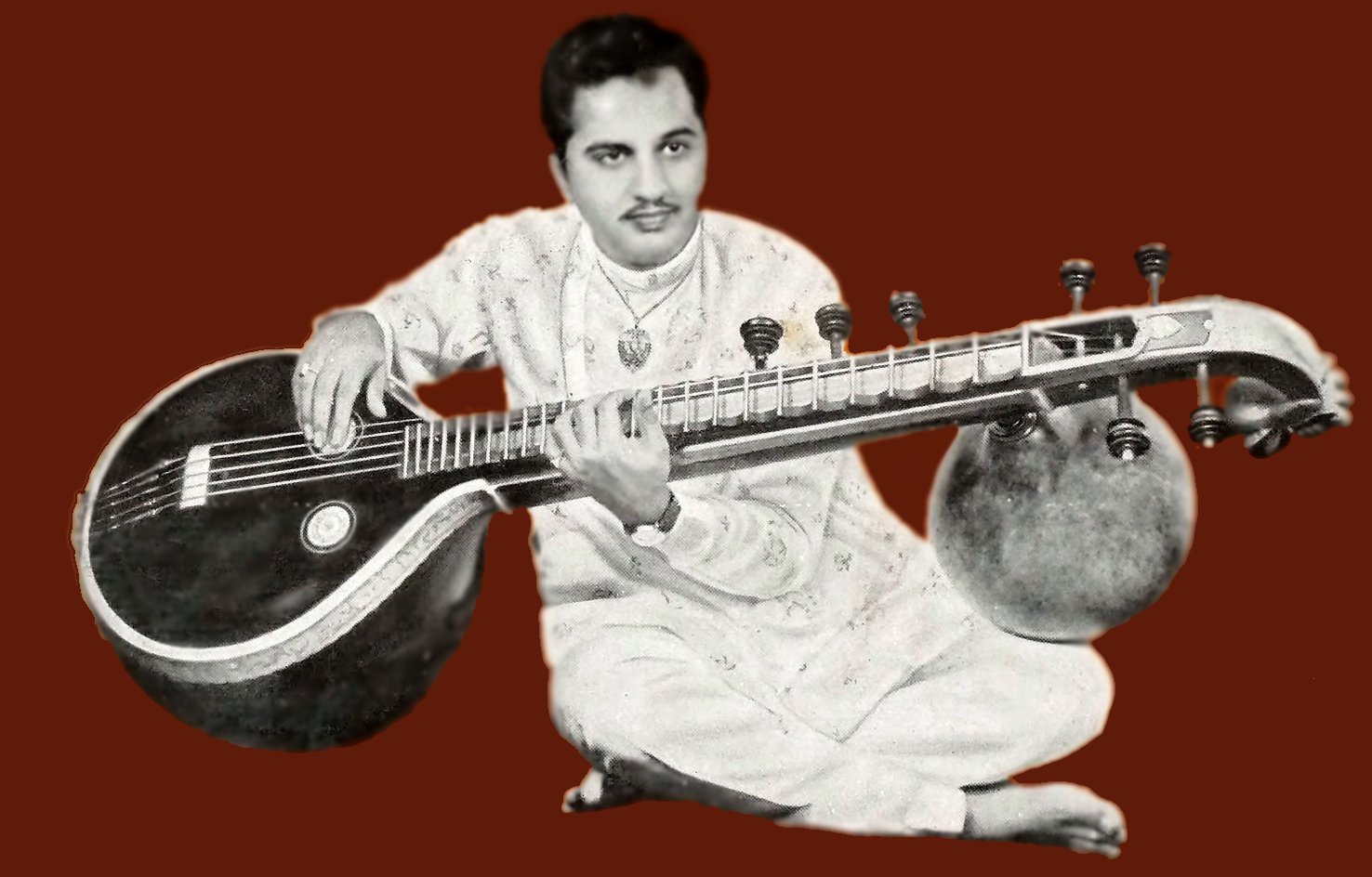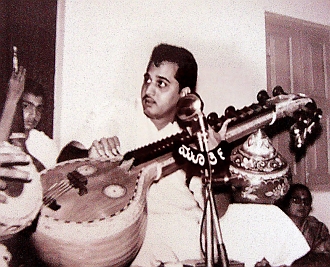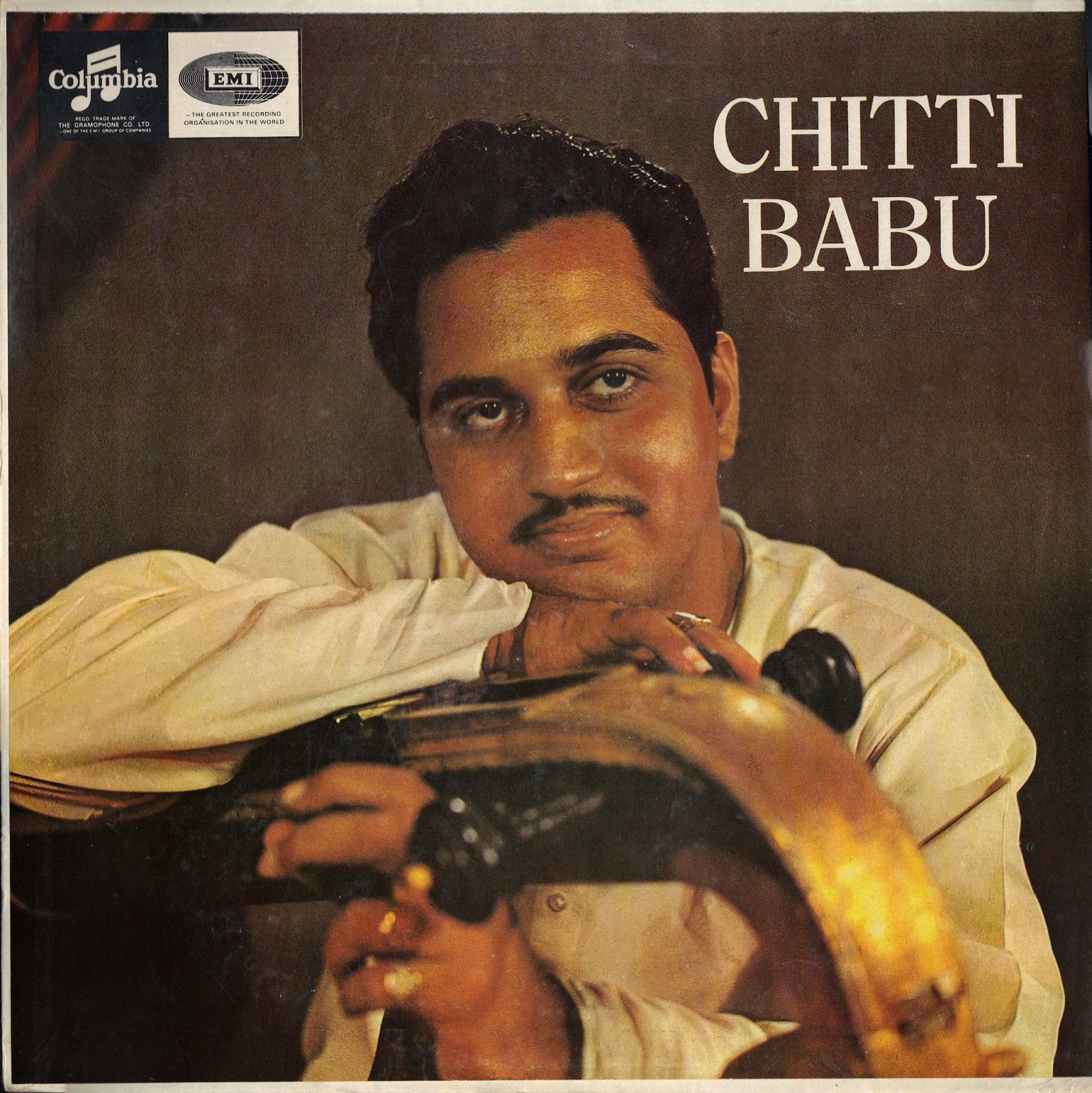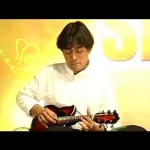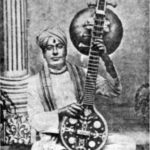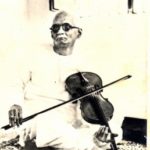As a follow up to last week’s article on the Veena, it is only natural that we highlight one of Andhra’s greatest Veena players, and one of India’s greatest in the modern era. Like many of our artistes, he too did not receive much deserved national recognition, while he was still living. We intend to take a small step towards setting that cultural record straight and give this vainika par excellence his due.
Our next musical Andhra Personality is a man who may be all but unknown to the younger generation, but to people of a certain age, is not only famous but is fondly remembered for his talent. We are of course speaking of none other than the divinely gifted Chitti Babu.
Background
Born on October 13, 1936, this Andhra gandharva was born to Challapally Ranga Rao and Sundaramma in Kakinada. His early childhood was spent in Pithapuram, and the family later moved to Chennai. Originally named Hanumanlu Challapally, his nickname became so popular his father legally changed it to Chitti Babu. Inarguably gifted in the truest sense of the word, he stunned his father, who was playing the Veena, when at the age of five, young Hanumanlu corrected his mistake. From that day on, Chitti Babu the child prodigy was dedicated to Sarasvati’s vaadya. He gave his freshman public performance at age 12. He learnt first from his father, and then took basic training from his first teachers Pandarala Upmakkaya, Singaralu, and Eyyuni Applacharyulu.
Nevertheless, Chitti Babu would forever remain associated with his Veenacharya, Emani Sankara Sastry garu, a renowned Andhra vainika in his own right. Together, they would virtually define the guru-sishya tradition among Telugu musicians, with both teacher and student taking pride in their mutual association. Chitti Babu would honour Sastry garu throughout his later life, and even played at his guru’s final public performance.
Interestingly enough, his first big break was in acting. As a child artiste, Chitti Babu acted in Laila-Maju (starring Bhanumathi and Akkineni Nageswara Rao).He continued as a struggling instrumentalist with a long innings in playback (1948-1962). He even became a music director for films in Tamil and Telugu—Sri Raghavendra Vaibhava being one of his key productions. Nevertheless, he was determined to make his name as a classical veena artiste and finally achieved his dream after decades of hard work. Coming to notice of the carnatic elite, he soon peformed to packed public performances in music halls around the world.
He married Sudakshina Devi and had children during his playback phase. Regardless, he managed to balance work and family due to the strong and dedicated relationship he and his wife had. Here is a heart-felt family-run website that serves as a tribute to his memory and legacy.
Unafraid to break from tradition, Chitti Babu was that rare classical performer who respected tradition, and even honoured it, but nevertheless sought to innovate. He freely experimented with his vaadya of choice, progressively moving from the venerated Saastriya standards to Playback to Western to Fusion. He even composed original musical works, in many cases dedicating the piece to capturing a particular sentiment or emotion (bhava) rather than following the regimented strictures. Indeed, he evolved his own style on that specific basis.
Chitti Babu passed away in 1996, just short of his 60th birthday.
He had traveled extensively across India and also to USA, Europe, Australia, Middle East and Asia Pacific and had performed to jam packed auditoriums for nearly 5 decades, transcending many barriers and taking his music and along with it, a part of India’s rich cultural heritage across the world.[1]
Wedding Bells
Quite possibly one of the most easy to appreciate of his pieces is Wedding Bells. It is an original composition quite obviously composed in the Western style. It shows not only his adaptability as a composer, but the versatility of the veena itself. To listen to it is to experience a Spring day on strings.
Indeed, his life’s mission and life’s work was proof of this rooted cosmopolitanism. In contrast to our modern rootless cosmopolitans, he was able to preserve and pass on tradition, while adding onto it and even transcending the training itself to commune directly with nature. No composition better displayed this then when Chitti Babu captured the cuckoo bird’s very character on his beloved veena.
Kommalo Koyila
Achievements
“No Critic is Greater than the Artiste; No Artiste is greater than the Art.” [1]
Chitti Babu was not only a musician, but a composer as well. Despite being classically trained and performing Saastriya Sangeeta standards, he had the creativity to musically experiment with different styles. He would even effortlessly play western classical standards, as well as make his mark in the world of playback. But while he first made his name with movie scores, he would also ascend to the notice of the royal cultural connoisseur of his time.
“HRH Maharajah of Mysore – Sri Jayachamarajendra Wodeyar after hearing Chitti Babu play in 1967, in a spontaneous gesture, removed the gold chain with a resplendent pendant that he was wearing on that day, and put it around Chitti Babu’s neck as a mark of appreciation and admiration. Chitti Babu considered this, one the greatest honours he had received because HRH Shri Wodeyar was considered to be a great connoiseur and was also known to be a “Musician among Princes and a Prince among Musicians”. Since that day, Chitti Babu proudly wore this gold chain and pendant for all his concerts, all his life”.[1]
Chitti Babu may never have been given his due by the arriviste “secular” elite of Delhi, but the traditional elite of Mysore recognised and honoured a cultural gem when it had the chance. Padma Sris may have devolved to popularity polls, but the cultural doyens and doyennes of aristocratic Mysuru, showed the nature of an elite with true taste—generosity to the deserving. Beyond this notable episode, Chitti Babu accumulated many accolades in his comparatively curtailed career. Here is a brief listing of them:
- First called Vainika Sarvabhauma in 1968
- Annointed Vainika Shikhamani by Maharajah of Mysore Jayachamarajendra Wodeyar
- Asthana VIdvan Tirumala Tirupati Devasthanams
- Honoured as Telugu Velugu by Andhra Pradesh CM in 1981
- Awarded Kalaima Mani by Tamil Nadu CM in 1972 & State artiste title by MGR
- Honorary Doctorate by Andhra University (1984)
- Sangeet Natak Akademi Award, 1990.
Above all, however, was his creation of a new style. Verily, this is what cemented not only Chitti Babu’s place in the Indic Veena Pantheon, but his musical legacy as well.
While continuing with the principles of his Guru’s pioneering school – the Emani “Bani” (tradition/style), Chitti Babu, created and evolved a distinctive style and identity, entirely his own. The exquisite tonal quality and versatility that have been his magical hallmarks of his style of playing the Veena, saw him produce sounds as varied as the majestic Vedic Hymns or as delicate as the Cuckoo’s voice or even play many western-music based compositions of his own.[1]
Legacy
“Veena is as Old as the Vedas and yet, as Modern as Tomorrow.” [1]
The life and times of those celestial souls who are veritably born with vaadya in hand, may appear all too brief, and be cause for disbelief, for those of us who appreciate their legacy. Nevertheless, like all comforting bromides, perhaps the good really do die young, and the talented shoot across the societal sky like a shooting star. Challapally Chitti Babu was inarguably one such star, and his contributions to the Divine Instrument (and the national instrument) demand not only documentation, but propagation. The younger generation, reared on Youtube, should be guided to get the most out of technology, by listening to music that feeds the soul (rather than that which spoils the appetite…).
He was known to reproduce the songs and compositions in an almost vocal like tonal quality on his Veena, and was also known to evoke deeply emotional and appreciative responses from his audiences.[1]
Where Chitti Babu truly stood out, however, was in the tonal quality of his veena playing. A difficult instrument, veena needs a fine balance between musical resonance and notal crispness. Rare among modern vainikas, this exponent of haute culture achieved the perfect balance. Perhaps no performance better demonstrates that than this one.
His live at Waldorf Astoria album for the New York-based Oriental label brought him to wide attention in the West [3]
It is an utter disgrace of the delhi set masquerading as national elite that they failed to recognise this national and international musical star during his life. Instead, it elects to bestow padma sris on pop culture primadonnas coasting on name rather than genuine merit, and whose notable contribution to “culture” is “Hum Tum”. Let culturally degenerate south delhi debutantes have their hum tum; those of us with culture will hum the tunes of this renowned instrumentalist, instrumental in stamping the veena on the consciousness of a generation (or three). Celebrated throughout the South, Chitti Babu is without a doubt one of India’s great Veena players of the present era.
His legacy remains cherished to this day. Traditionalists may demur any deviation from tradition, but for Master Chitti Babu, the Master Vainika, love for the Veena came first, whether via tradition, folk, or fusion.
“Traditions must be respected – but conventions can be broken”.[1]
Sri. Rajhesh Vaidhya performing his Guru Sri. Chittibabu’s composition
Chitti Babu is remembered for many things veena-related. His venerable relationship with this revered guru Emani Sankara Sastry (complemented by that with his own sishya Dwibhashyam Nagesh Babu) is a singularly scintillating example of the guru-sishya parampara.He brought a rare delicacy to lute of the Devas, and an even rarer self-awareness in his performances.It was a swara sensibility that was refreshingly masculine, and yet, unabashedly sensitive. Like Brahma with Sarasvati, he cradled and caressed the veena, revealing the many layers of her being in their full vibrance.
He may have been born Hanumanlu Challapally, but he will remain Chitti Babu for all those who knew of him in his all-too-short life. Like yet another Andhra Gandharva, he left this world all too soon, but then, the lives of those vaadhyaadharas who are divinely talented do quickly return to the Deva who sent them.
“Veena is my Mission in Life”.[1]
References:
- http://www.veenachittibabu.org/
- http://www.thehindu.com/features/friday-review/music/Chittibabu-remembered/article15718373.ece
- Broughton, Simon and Mark Ellingham & Richard Trillo. World Music: Latin & North America, Caribbean, India, Asia and Pacific. London: Penguin Books.2000
